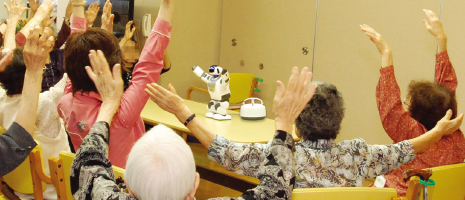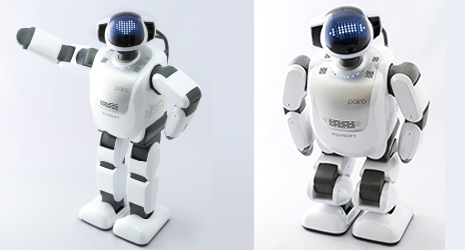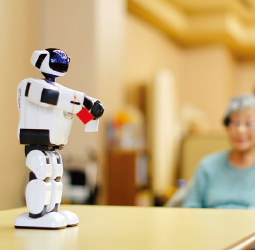Home > Highlighting JAPAN >Highlighting Japan December 2015>A Society of Health and Longevity
Highlighting JAPAN


A Clever and Caring Companion
PALRO, a humanoid robot being used at eldercare facilities in Japan, helps prevent dementia, assists in therapy and even lightens the workloads of nursing staff. Just how much of the burden of creating a healthy, long-lived society can companion robots like it carry on their shoulders?
“PALRO, dance to ‘Koi Suru Fortune Cookie,’ ” Toshiyuki Takaha of Fujisoft Incorporated’s Robotics Division says, commanding the small robot before him to move to a 2013 J-pop hit. Seated atop a table, PALRO—whose name is formed from PAL for “friend” and RO for “robot”—looks up at Takaha and replies, “Understood,” and begins to dance rhythmically.
This forty-centimeter-tall interactive robot doesn’t just dance—PALRO also engages in conversation, plays games and presents quizzes. It understands human speech, and by actively brokering communication and interacting with PALRO, users can maintain and improve their mobility and speech functions and avoid cognitive impairment, thus gaining therapeutic benefits as well.
Many of Japan’s eldercare centers offer time devoted to exercise, music and art as part of the regimen for maintaining physical and emotional wellness. This is when PALRO is primarily deployed, generating continuous mutual conversation, providing entertainment like dances and quizzes, and offering the latest news and weather reports. Not only does the diminutive entertainer soothe and delight the elderly, it also helps reduce the workloads of nursing personnel. PALRO has been introduced at roughly three hundred facilities so far, and the response has been positive.
Takaha says: “We wanted to advance the role of computers from a tool to a human partner.” Fujisoft, thinking ahead to a future where information devices intuit our needs without direct input via keyboard or mouse, set out to develop a communicative humanoid robot. When a human user finds PALRO standing on a table, the robot is at below eye level and of a size that is not intimidating. With natural movements and kind comments, seamless voice recognition that picks up a speaker’s words even amid background noise, and the ability to remember over a hundred individuals’ faces, names, hobbies and interests, PALRO was made “with a design and voice that would endear it to users, with a natural response, and with no other detail left to chance,” according to Takaha. PALRO also has a continuous Internet connection that allows its software to be updated automatically.
Even so, why have the elderly taken so quickly to PALRO? “One woman with slight cognitive impairment loves him, saying, ‘Talking with this little guy is so relaxing,’ ” Takaha notes. “She says that because the other party is a robot, she feels no apprehension and can speak her mind.” When the elderly are aware of their own cognitive impairment, they hesitate to talk to others, which only exacerbates and hastens the onset of the condition. Creating an environment in which the elderly are more inclined to engage in conversation is a necessary step toward preventing this situation.
Another issue is how to engage former male career professionals who tend to struggle to join in group activities at these facilities. “PALRO is a sophisticated robot based on real technology, not the kind of sleight of hand designed to amuse children,” Takaha notes, “so male users also take an active interest in its sophisticated abilities.” At one facility, for example, an eighty-five-year-old former engineer is “in charge of” PALRO, becoming a real hero during recreation time. “The man was so hale and hearty that I thought he was a member of the nursing staff and not a resident,” Takaha says.
PALRO’s abilities have been further refined through its interactions with users at nursing facilities, and it now boasts a much kinder, gentler manner toward humans. Cognitively impaired residents who refuse baths and food welcome these aspects of care when invited by their beloved PALRO. In this way, PALRO’s value as a support member is now becoming clear in the nursing sector, where there was some initial reluctance to entrust nursing to a robot. “We encourage people to watch the way in which human and robot coexistence takes shape in Japan, a developed country with an aging society,” Takaha says enthusiastically.
© 2009 Cabinet Office, Government of Japan







